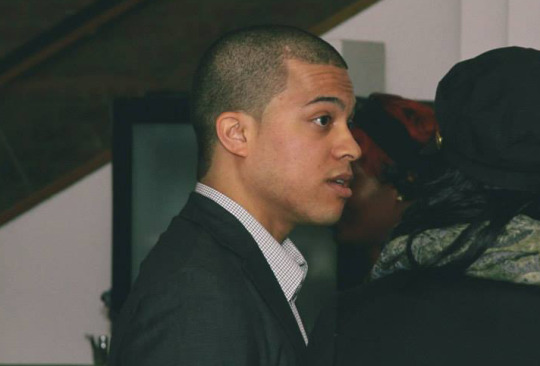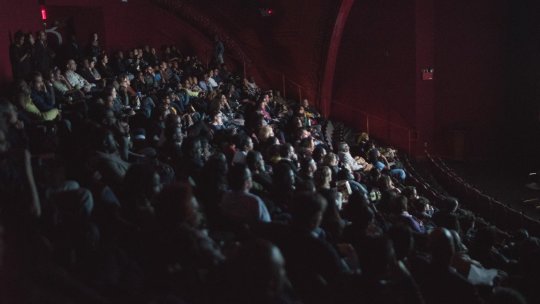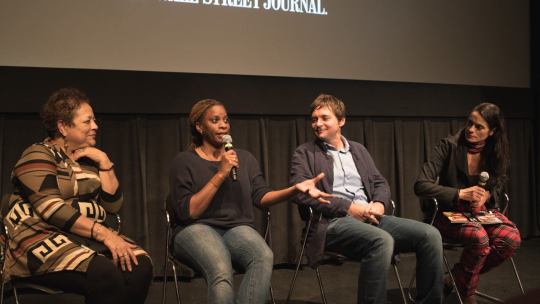Conversations | Meet ABI Business Caribbean Film Academy
Part of NYFA Arts Business Incubator’s first cohort, CaFA is increasing the visibility of Caribbean films and filmmakers in NYC and beyond.
Established in 2012, Caribbean Film Academy (CaFA) is a non-profit organization dedicated to the promotion and support of Caribbean filmmaking and filmmakers in the region and the Diaspora. CaFA’s work is focused on promoting and sharing the art of storytelling through film from the perspective of the Caribbean. The organization is part of NYFA’s Arts Business Incubator (ABI) program’s inaugural cohort, where they receive custom-tailored, formalized support from NYFA’s staff and network of experts to help them fully realize their mission. CaFA is also part of NYFA’s Fiscal Sponsorship program, which helps individual artists and emerging arts organizations optimize fundraising efforts.
We spoke with CaFA Co-Founders Romola Lucas and Justen Blaize at the close of National Caribbean-American Heritage Month to see what they’ve been up to, and what’s next for their growing business.

NYFA: What’s the Caribbean film industry like in both the Caribbean and in New York? How’d you become interested in helping to support it?
Caribbean Film Academy: Overall, the Caribbean film industry can best be described as emerging, but depending on where you are, the “industry” is in different stages of development. The Spanish and French Caribbean are producing more films for the regional as well as global markets, than the English and Dutch Caribbean. The largest film festival dedicated specifically to Caribbean films is the Trinidad & Tobago Film Festival, and through the Festival and other local initiatives, Trinidad & Tobago has emerged as a leader in film in the English Caribbean.
With respect to New York, the picture is not as clear. The Caribbean arts and culture scene generally is becoming more and more vibrant through the activities of the dance, literary, cultural, and film organizations. With respect to film, it is difficult in many instances to identify the Caribbean filmmakers and actors in New York and the remainder of the Diaspora unless they themselves identify as Caribbean, since their work tends to be more reflective of the country they’re currently living in and not the Caribbean.
Having said that, through the work of our organization, we have created a year-round platform for anyone interested in the Caribbean film, by programming screening series and hosting filmmaker Q+As that raise the level of awareness of the existence of these films and filmmakers, growing an audience for them, and providing opportunities for filmmakers and viewers to interact and be of more support to each other.
We became interested in wanting to support the filmmakers, because we ourselves wanted to see Caribbean films. We were tired with the lack of diversity in cinemas in New York, showing mostly Hollywood films, and with the smaller, artsy venues, showing mostly foreign, as in European, films. We wanted to see films about our lives and cultures, see our stories, and hear our accents on the big screen. The Caribbean as whole is very diverse, but there are many similarities in the ways in which we live which can be shared through film, allowing people from different countries to learn about life in other countries they’ve never actually visited. We started off small, watching films with a few other people sharing this same interest at Nicholas Variety on Fulton Street in Brooklyn, and we have grown from there.
NYFA: Tell us more about the ways in which CaFA is increasing the visibility of Caribbean films and filmmakers. What’re your key vehicles for promotion?
CaFA: We are doing this work in several different ways:
- The Caribbean Film Series. Our signature program and an almost quarterly series where we bring 4/5 of the best in Caribbean films to screen per year at Brooklyn Academy of Music.
- CaFA Cinema Nights. Where we started: our monthly screening series. It’s being held this year at the IFP Media Center in Brooklyn, where we present regularly-scheduled screenings of Caribbean films.
- Third Horizon Caribbean Film Festival. A festival based in Miami that was started with a grant from the Knight Foundation in 2016 in partnership with Third Horizon Media to showcase the best in Caribbean cinema.
- Timehri Film Festival. A Guyanese and Caribbean film festival we started in Guyana to provide a platform for Guyanese filmmakers, as well as to share films from other countries in the Caribbean, with Guyanese audiences.
- Studio Anansi Tv. An online platform similar to Netflix that we created specifically for Caribbean films, to make them available to audiences worldwide.
- Caribbean Film Project. A production program, through which we co-produce short films by emerging Caribbean writer/directors.

NYFA: What are some of the projects you’re working on now? Did you do anything special to celebrate Caribbean-American Heritage Month?
CaFA: With our programming pretty much established, our projects are mostly internal and geared at growing the organization as a whole, as well as presenting individual programming.
We are currently rebuilding two of our websites, and will be working with a distributor to develop Studio Anansi into the go-to distribution company for Caribbean films, as well as working on partnerships in other countries to host film screenings and festivals in order to share Caribbean films more widely in the Caribbean, and in the United States, Canada, and England.
For Caribbean-American Heritage Month (CAHM) this year, we are hosting a special outdoor screening in Brooklyn’s Brower Park of a film adaptation of a short story by one of the Caribbean’s favorite authors, Earl Lovelace. The film, Joebell and America, by Asha Lovelace, is based on the short story by the same name, written by her father, Earl Lovelace. It is an immigrant story, speaking to the experiences of many Caribbean people living here in New York. We are partnering with Union Docs and the Luminal Theater to present this screening, which will be held tonight, June 28, at 7:00 PM.
NYFA: We don’t want to put you on the spot…but do you have any favorite Caribbean films or filmmakers to recommend to our readers? Is there a film that would make a good introduction to the Caribbean film industry for the unfamiliar?
Ha. Now this is a tough one.
Some good contemporary films from the English Caribbean (not one, but a few 😊 ) are Children of God by Kareem Mortimer (the Bahamas), God Loves the Fighter by Damian Marcano (Trinidad & Tobago), Better Mus’ Come by Storm Saulter (Jamaica), Play the Devil by Maria Govan (the Bahamas), Ring di Alarm by the New Caribbean Cinema (Jamaica), Captureland by Nabil Elderkin (shot in Jamaica), The Sweetest Mango by HaMA Films (Antigua & Barbuda), Art Connect by Miquel Galofré (shot in Trinidad & Tobago), and Doubles with Slight Pepper by Ian Harnarine (Trinidad & Tobago).
These films cover a variety of stories, from LGBT to love, art, folklore, and music, and are generally stories of everyday life in the Caribbean, giving those unfamiliar with the “real” Caribbean, with life beyond the parties, white sand beaches, and blue waters, a good understanding of what it actually means to live in “paradise.”
Some good emerging filmmakers are Shaun Escayg from Trinidad & Tobago (Fish, Noka): Keeper of World’s), Chris Guinness from Trinidad & Tobago (Pothound, Capt T+T), Gabrielle Blackwood from Jamaica (Denis), Lisa Harewood from Barbados (Auntie), Mariel Brown from Trinidad & Tobago (Smallman: The World My Father Made), Jason Fitzroy Jeffers from Barbados (Papa Machete), and Vashti Anderson from Trinidad & Tobago (Moko Jumbie and Jeffrey’s Calypso).
These are some of the filmmakers are at the forefront of defining what it means to be a filmmaker in the Caribbean. They are using technology like VFX and animation and are not afraid to extend the bounds of their creativity in the context of the Caribbean in terms of style and the types of stories they are telling.

NYFA: What drew you to ABI? What’s your experience been in the first year (now in the second year) of the program?
We were drawn to ABI by the opportunity to work behind the scenes, to make our organization sustainable. We started the organization and ran it all these years on our own, coming up with program ideas to fill the needs we found along the way, and figuring out which ideas would work best over the long term. With the resources NYFA has to offer, we hoped to be able to better organize and fund CaFA and put it on a path to sustainability.
We have had a fantastic experience in the program. The program’s coordinator, Peter Cobb, is an amazing resource and an avid supporter of the work we do. With the financial resources made available to us through the program, we were able to work with a consultant who helped us to organize our programming, develop our branding, and build our board, as well as develop a budget and fundraising plan for our activities. We were also able to work with a web developer to rebuild and customize our websites, bring on a person specifically dedicated to promoting our programs through social media, and begin development of an app to improve the online viewing experience for our subscribers. With NYFA’s organizational resources which were made available to us, we were able to network with other similarly situated organizations, get a mentor who is now actively supporting our efforts by becoming a member of our board, and gain further insight into successfully running an organization by participating in the workshops offered through the program.
NYFA: What’s next for CaFA?
CaFA: On an organizational level, we will be getting our board up and running, and executing our fundraising plans to begin putting the organization on the sustainability track. On a programming level, we are working to grow our audience base to see greater attendance at screenings and festivals, as well as viewership online.
Our more long-term plans include creating a Caribbean film festival in New York, as well as building a facility to function as a co-working, event, performance, and exhibition space for Caribbean organizations working in dance, film, culture, literature, in the New York area.
Please visit our website to learn more about NYFA’s Arts Business Incubator program. Stay tuned for future posts featuring the members of the ABI cohort.
NYFA Fiscal Sponsorship’s next quarterly no-fee application deadlines are June 30 and September 30, and you can learn more about NYFA’s Fiscal Sponsorship program here. Read about other exciting projects utilizing sponsorship in our NYFA Fiscal Sponsorship Directory.
– Interview conducted by Amy Aronoff, Communications Officer
Images from top: Romola Lucas, Photo Credit: Justen Blaize; Justen Blaize, Photo Credit: Davone Alexis; audience cross section at the Caribbean Film Series, Brooklyn Academy of Music, Photo Credit: Justen Blaize; Filmmaker Q&A at the Caribbean Film Series, Brooklyn Academy of Music, Photo Credit: Justen Blaize





